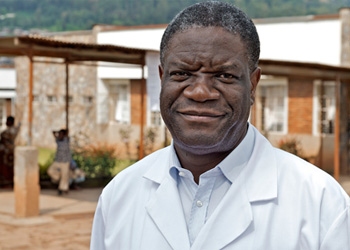Denis Mukwege

Denis Mukwege, the Congolese doctor who has dedicated his life to caring for female victims of rape in the Democratic Republic of the Congo, is the winner of the Calouste Gulbenkian Prize 2015.
With a total value of €250,000, the Prize will be delivered on Monday 20th July, 7pm at the Calouste Gulbenkian Foundation headquarters, in Lisbon.
Presided over by Jorge Sampaio, former President of Portugal, the Calouste Gulbenkian jury has recognized the distinguished and extraordinary humanitarian actions engaged in by the gynaecologist Dr. Denis Mukwege in the Democratic Republic of the Congo, a country in which rape and sexual mutilation are deployed as weapons of war.
Born in 1955, Dr. Mukwege specialises in the treatment of victims of rape carried out by armed militias, especially during the civil war (1998-2003). The Panzi Hospital he founded in Bukavu in 1999 has become a world renowned in repairing and caring for the damage caused by this type of violence. Dr. Mukwege’s vision expanded to provide psychological, social and legal support to dozens of thousands of women in addition to the full spectrum of medical and clinical care they need.
Despite the end of the civil war in the Democratic Republic of the Congo in 2003, various armed groups and other criminal elements continue to struggle for control over the country’s highly valuable natural resources; fostering a climate of war and instability in which women prove the main victims. Rape serves as an instrument of control through terror, and often occurs systematically in villages with the entire families or communities forced to view and witness the attack. The aggression occasionally extends to further torture and mutilation of the women. Many are disfigured by injuries as a result of gunshot wounds to their genital organs. This strategy, often applied by the armed militias, has further devastating consequences when women along and community members are forced to abandon their villages, fields, and possessions.
In October 2012, Dr. Mukwege narrowly escaped assassination following his outspoken condemnation of sexual violence as a means of control over women and local populations. Concerns for his safety continued following the assassination attempt, and he was compelled to take his family and live abroad for a time. The women of Panzi inspired his return to Panzi, where he resumed his duties as Medical Director and thought leader, in Bukavu, in Congo, and around the world. Dr. Mukwege was, and remains inspired, by the determination of women to struggle against the atrocities they are the victims of.
Dr. Denis Mukwege, who will be in Lisbon to receive the Calouste Gulbenkian Prize, previously won the Olaf Palme Award in 2008 and the Sakharov Award in 2014, and among other distinctions.
The Calouste Gulbenkian Prize
With a value of €250,000, the Calouste Gulbenkian Prize is awarded to either an individual or institution that has defended the values essential to human dignity. The award was first made in 2012 to the West-Eastern Divan Orchestra, the musical group led by Daniel Barenboim, and has been picked up since then by the Alexandria Library (2013) and the Community of Sant’Egidio (2014).
The Calouste Gulbenkian Prize jury is chaired by Jorge Sampaio (President), Vartan Gregorian (Carnegie Corporation, USA), Commander Pedro Pires (former President of the Republic of Cape Verde), HRH Princess Rym Ali of Jordan (founder of the Jordan Media Institute), António Nóvoa (former rector of the University of Lisbon) and Mónica Bettencourt-Dias (a researcher at the Gulbenkian Science Institute).
Established in 1956 as a Portuguese foundation for the whole of humanity, the Calouste Gulbenkian Foundation’s original purpose focused on fostering knowledge and raising the quality of life of persons throughout the fields of the arts, charity, science and education. Bequeathed by the last will and testament of Calouste Sarkis Gulbenkian, the Foundation is of perpetual duration and undertakes its activities structured around its headquarters in Lisbon (Portugal) and its delegations in Paris (France) and London (the United Kingdom).
